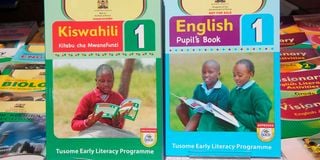Premium
KLB eyes regional markets for Kiswahili books as other countries adopt the language

Text books at the Kenya Literature Bureau, Nairob.
The Kenya Literature Bureau (KLB) is eyeing new regional markets for its Kiswahili books after the language was adopted by countries outside of Kenya and Tanzania.
Uganda and the African Union (AU) recently adopted Kiswahili as the official language, opening up a new market for KLB, a State-owned corporation, and other publishers in Kenya and Tanzania.
In July 2022, Uganda’s Parliament adopted Kiswahili as an official language and made it a compulsory subject in primary and secondary schools.
Victor Lomaria, the outgoing chief executive of KLB, noted that people from countries such as Brazil, Australia, South Africa and Argentina were buying the firm's Kiswahili books from Amazon, the e-commerce platform.
“I think the market for Kiswahili outside Kenya is promising. Now that Uganda has an official language to be taught in primary schools across the country, that is a potential market for us,” said Mr Lomaria.
KLB’s biggest market is in Kenya, where the state corporation enjoys the lion's share of the market for textbooks for primary and secondary schools.
But as the region gets integrated, many Kenyan firms, including publishers, have been looking beyond the border. Longhorn Plc, which is listed on the Nairobi Securities Exchange (NSE), operates in eight markets with established subsidiaries in Kenya, Uganda, Tanzania, Rwanda, the Democratic Republic of the Congo (DRC), Cameroon and partnerships in Zambia and Malawi.
South Africa has also introduced Kiswahili as a foreign language.
“We are also planning to tap into that market,” said Mr Lomaria.
In February 2022, following a request by Tanzanian Vice President Philip Mpango, who argued that over 100 million people in Africa speak Swahili, the 55-member AU adopted Kiswahili as an official language alongside Arabic, English, French, Portuguese and Spanish.
"So we will compete with Tanzania to nurture and train people on speaking the Kiswahili language and producing materials for those countries,” Mr Lomaria said.
English has been Uganda's only official language since independence in 1962. Kiswahili was proposed as the second official language in 2005, but it was only taught as an optional subject in secondary schools.
While Kiswahili is the region's lingua franca, spoken extensively in Tanzania as both a national and official language, it was adopted as the official language of the EAC in 2017.
EAC member states are Tanzania, Kenya, Uganda, Rwanda, Burundi, South Sudan, the Democratic Republic of Congo and most recently Somalia.
In Kenya, Kiswahili has been the national language since 1964 and is official since 2010. Burundi made Kiswahili a compulsory subject from the primary school level in 2007, while Rwanda adopted it as an official language in 2017.
Kiswahili is the most spoken African language on the continent from southern Somalia, eastern DRC, Malawi, Zambia, Mozambique and the Comoros Islands to South Sudan. The African Union made it an official language in 2004, in addition to English, Portuguese, Arabic, and French.
The Southern African Development Community (SADC), of which Tanzania is a member, adopted Kiswahili as its fourth official language in 2019 in addition to English, Portuguese and French.
Publishing companies in Kiswahili-speaking countries such as Kenya and Tanzania will be fighting for the market for Kiswahili books as it grows.
KLB is a leading publisher in Kenya, with gross revenues of Sh3.45 billion in the fiscal year ending June last year.
Other main players in the publishing industry in Kenya include Oxford University Press, East African Publishers (EAP), Longhorn Publishers Plc, Mountain Top and Moran.





